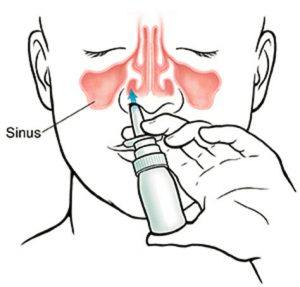Nasal sprays for allergies and sinuses: types and side effects
Has your suffering with sinuses and allergic rhinitis become unbearable? Some people can no longer live without use Nasal spray for allergies and sinusesWhat are these sprays and what types? How is it used? And does it have damage? All of that you will know through this article.
What is a nasal spray?
It is a method for treating nasal obstruction and congestion resulting from allergies in the nose and sinusitis, which provides a solution to the suffering from difficulty breathing and pain due to these health problems. These sprays contain effective substances and medicines that help in treatment by spraying them in the nose. Some of these can also be purchased Nebulizers from the pharmacy without a prescription.
Types of nasal sprays and their side effects
There are more than one type that you can find in the pharmacy. The main types and some of their reported side effects include:
1- Antihistamine spray for allergies
This spray helps treat congestion, runny nose, sneezing, and itching caused by allergies. Its active ingredients include azelastine and olopatadine. The spray can be better than oral antihistamines because it may not cause drowsiness in some people, but it should not be purchased without a doctor’s prescription.
its side effects
- Feeling a bitter taste in the mouth.
- feeling tired
- Weight loss.
- muscle pain
- Nasal burning.
2- Nasal decongestant spray
These sprays help shrink the blood vessels in the nose and the tissues that cause nasal congestion. This type can be purchased without a doctor’s prescription, but it should not be used for more than 3 consecutive days because it may backfire after these days and your nose becomes more blocked.
its side effects
- Stinging and burning sensation in the nose.
- increased mucus
- nasal dryness
- sneeze.
- nervousness.
- Nausea and dizziness.
- Headache.
- difficulty sleeping
- Cough.
And you should go to the doctor immediately if you feel that your heart rate is faster or slower than the usual normal rate.
3- Cromolyn sodium sprays
These sprays are considered preventive to protect against the release of histamine and chemical substances that cause allergies in the body, which can have an effect on some within 30 minutes, preventing the appearance of some symptoms such as a runny or stuffy nose and sneezing. You can use them a week or two before the start of allergy seasons, and after that you can Use it daily for several times.
their side effects
- sneeze.
- Nasal burning.
These inhalers are considered safe for most people, but you should consult a doctor if you suffer from wheezing due to asthma or sinus pain.
4- Steroid nasal spray
And it is called Allergy nasal spray Because these sprays can be the most effective among all types for treating allergies, but they take a longer time for their effect to appear (about a week), so they work to relieve itching, runny nose, tearing and sneezing.
Examples of active substances in it are: ciclesonide, fluticasone furoate, which must be prescribed by a doctor, and there are other active substances that do not require a prescription, such as fluticasone and triamcinolone.
its side effects
- Tingling and burning in the nasal passages.
- sneeze.
- Throat irritation.
5- Ipratropium sprays
This type requires a doctor’s prescription, helps stop mucus secretion and thus stops runny nose, but it is completely ineffective in relieving sneezing and congestion. This type also should not be used for patients with glaucoma in the eye and patients with prostate enlargement.
its side effects
- Headache.
- Nose bleeding.
- Sore throat.
- Nasal irritation.
6- Spray the saline solution
This type does not contain drugs in the known sense, but it relies on a saline solution that contains a concentration of salt similar to the percentage found in the body, and is considered a suitable solution to relieve congestion in the nose and inflammation of the mucous membranes and helps moisturize the nose. (Find out more about how saline works and how to use it)
How to use the nasal spray
Follow these steps so you can use the nasal spray properly:

- Shake the spray bottle well.
- Gently blow your nose to make sure you are blowing your nose well.
- Tilt your head forward and use your right hand to squirt the mist from the sprayer into your right nostril or vice versa while blocking the other nostril. Using this reverse method helps the active substances spread outwards away from the center of the nose.
- Press the sprayer firmly and gently into the nostril, but do not inhale forcefully so that the medicine does not enter your throat and you swallow it.
- Remove the spray from your nostril, then breathe through your mouth.
- You can repeat this dose 2 to 7 times as prescribed by your doctor.
- After you are done, clean the tip of the sprayer well before returning it to the bottle.
Are nasal decongestant sprays addictive?
Many people have a common belief that allergic rhinitis sprays can cause addiction, but this is what they suffer from called a rebound or reverse effect that occurs when using nasal sprays incorrectly, decongestant sprays as we have indicated should not be used for more than a few days, because their use The long term for consecutive days and in high daily doses makes the nose not respond to the active substances in it, thus becoming useless. It is worth noting that steroid nasal sprays do not cause this adverse effect and can be used daily for many years.
Precautions for using nasal sprays
should not be used Nasal spray for children Especially those that are dispensed without a doctor’s prescription, except after consulting the doctor and allowing him to do so. There are also several health conditions with which it is not recommended to use the inhaler, such as:
- Hypertension.
- heart disease.
- Diabetes.
- Thyroid problems.
- Urinary tract problems related to an enlarged prostate.
Therefore, we advise you to consult a doctor if you are taking some medications before using a nasal spray because it may conflict with the medication you are taking, and some people may experience unwanted side effects such as nosebleeds and, in rare cases, loss of sense of smell.

